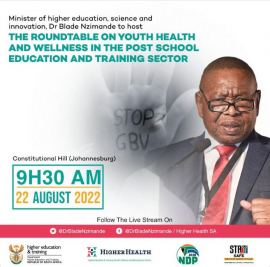
Higher Education, Science and Innovation Minister, Dr Blade Nzimande, has warned that the struggle for gender equality and women emancipation will always remain inadequate until young men are fully engaged and involved in the subject.
“My argument is essentially that the organisation and affirming of women is a a necessary but not sufficient condition for gender equality and women’s emancipation.
“At the centre of my argument is the necessity to grapple with the formation of masculinities in our families, communities and society as a whole, as a critical dimension to take forward the struggle for gender equality and women’s emancipation,” Nzimande said.
Nzimande made the remarks during a roundtable on youth health and wellness in the Post School Education and Training (PSET) sector, held at Constitutional Hill, Johannesburg, on Monday.
Held under the theme, ‘Generation Equality: Realising Women’s Rights for an Equal Future’, the roundtable was a platform to bring about a comprehensive, multi-sectoral approach to improving the mental health status of women in the PSET sector.
Nzimande emphasised that citizens should actively become combatants for a world where all people have equal rights and opportunities, and where girls are not afraid of walking home late at night and men and boys are not trapped in oppressive masculinities.
He said gender equality should become a reality, where both men and women are paid equally for work of equal value and share household responsibility.
The Minister said it is also important to understand that there is a deep interconnection between, on the one hand, violation of human rights and oppression and, on the other hand, exploitative economic systems, which tend to thrive and benefit from racial and gender inequalities in society.
“In fact, exploitative systems in turn reinforce such inequalities. Therefore, the struggle for genuine women’s emancipation must be accompanied by a struggle against exploitative economic systems.”
Realising women’s rights for an equal future
Nzimande said South Africa has made significant progress towards achieving gender equality since 1956, when 20 000 women marched to the Union Buildings in protest against the extension of pass laws to women.
Today, he said, South Africa’s progressive laws have seen more women serving in high-ranking positions in government than ever before.
“Access to education by young girls and women has improved substantially over time. Recent statistics depict a balance in gender parity ratios (GPR) amongst those who are functionally literate from 0.95 in 2002, to 0.99 (zero – no gender equality to one – full gender equality) in 2019, indicating that more women are now literate,” the Minister said.
In South Africa and globally, he said, one of the biggest challenges facing women is educational inequality.
“Access to education has played a pivotal role in ensuring that women have progressed to higher education levels. According to the Sustainable Development Goals (SDG) 2019 country report, gender parity ratios for female participation in tertiary education was 1.39 during 2016, underpinning the fact that significant strides have been achieved in ensuring universal access to education for everyone.”
However, Nzimande said it is important that in talking about improved conditions for women in South Africa since 1994, the focus must not only be on elite women, which would obliterate “the fundamental importance of the liberation of working class and poor women in urban and rural areas”.
“The provision of clean drinking water, electricity and other basic services like health and education has greatly contributed to the liberation of poor, especially black women, from the oppressions of having to walk for miles to fetch water and firewood,” the Minister said. – SAnews.gov.za


